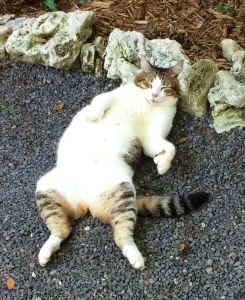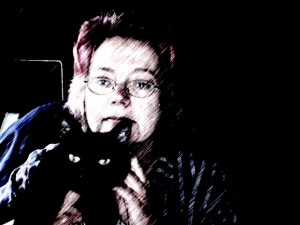
 Hello! One new thing I’m introducing for 2023 is a monthly social media chat in which I’ll catch you up with the ever-changing social media landscape.
Hello! One new thing I’m introducing for 2023 is a monthly social media chat in which I’ll catch you up with the ever-changing social media landscape.
In the first one, I’ll talk about Twitter, places to migrate to if you’re leaving Twitter, tools that can make that migration easier, and why you might want to establish a presence on some even if you’re sticking with Twitter.
Date: Saturday, January 7, 10 AM Eastern time via Zoom. It will be recorded and will go up later on the YouTube channel.
Cost: free for Patreon supporters; $5 and up patrons will be able to submit questions in advance
$10 for non-patrons
To reserve a slot, mail me at cat@kittywumpus.net, and if not a Patreon supporter or Rambo campus member, let me know how you’d like to pay.
...

It lets you post pictures, often with some sort of caption, and see what other people are posting. Unlike Facebook, it doesn’t play fast and loose with what you see, but gives you a stream composed of everyone you’re following.
Instagram features a number of filters as well as some basic editing tools that can be applied to uploaded photos. You can add extra filters with the 100 Cameras in 1 app or if you would like to edit the image extensively, try Pixlr-o-matic (http://pixlr.com/).

What do I post overall? Here’s a breakdown of the last 100 Instagram photos on my stream. Only five categories (event, books, and writing process photos) might be considered promotional; you’ll note those pictures occur roughly one in five times; even there, none of them directly sell a book, just mention it, and many are focused on other people and/or their work.
...

Is A Blog Mandatory?
No. But it’s advisable. You do want readers to be able to find you online and, more importantly, to find your work. You do want a website (and a mailing list, but that’s another post), but your website can be a static presence, something you put up and don’t update very often. In fact, if you have very minimal time to invest or otherwise want to limit your online presence to the bare bones, don’t include a blog. Few things look sadder than a blog with a single entry from five years ago, usually about trying to make oneself blog.
Something You Can Always Blog About
One reason to blog on your website is that it means the website is being updated frequently, which makes the site more likely to turn up on search engine results. So here’s two ways you can generate a weekly post. The first depends on having a social media presence; the second does not.

Certainly there are ways to get the most bang for the effort out of these posts: include an image, have a good tagging system, make the most of keywords. But those are advanced techniques, and unnecessary to this basic effort.
If You Only Hate Writing about Writing
As I mentioned above, you do not have to blog about writing. In fact, the world is full of posts about avoiding adverbs, and you probably do not have anything to say on the subject that has not already been said. So blog about something else.
Blog about your adventures in learning how to pickle vegetables or speak Mandarin. Document some longterm project like your garden remodel or the bookstore your partner is opening. In a pinch, you can always fall back on writing about the books you’re reading. The most interesting and effective blogs out there don’t just show you the writer’s writing, but something about them as a person.
Always Be Closing is NOT a Good Axiom for Writers
While all writers need to think about how to help readers find their work, if they are too pushy about forcing them to it, those readers will balk and go no further. Don’t make your website all about sell sell sell. Don’t make it your social media focus nor what you blog about over and over again. You will be wasting your time and driving away fans.
That’s why showing readers scraps from your writing is effective. You are giving them something that is (hopefully) genuinely interesting here and now. If they like it, they may look for it later on when it comes out. Let your writing and its quality do the work of selling for you and don’t worry about the set of steak knives. Just write.
#sfwapro
...

This year I switched the focus of my social media efforts to Twitter, because it seemed to me Facebook was an increasingly ineffectual way to reach fans. Because of that, I’ve been spending a lot more time looking at the people following me on there as well as thinking about Twitter, its philosophy, and its uses overall.
Why does a writer want to be on Twitter? The reason is more than just “sell books”. It’s often a way to network with existing fans (who will buy more books in the future), cultivate new fans, connect with peers and other industry professionals, to find out industry and writing news and yes, of course, to procrastinate in a thousand different ways.
I used to automatically follow people who followed me but nowadays I spend a few minutes to click through and look at their page and the tweets it contains. I’ve noticed that a lot of people are doing it “wrong,” or at least in a way that ends up detracting from their purpose. Most of these are easy fixes. Here’s some tips for setting up an account on there and as well as for maintaining a presence.
...

Stuff I posted on the blog:
I announced I am running for SFWA Vice President. #sfwapro is a tag you’ll be seeing on posts intended to appear on the @sfwaauthors feed as well.
The Women Destroying SF Kickstarter will sponsor my destroying Fantasy if they hit a $35k stretch goal.
I talked about my January writing news and provided a teaser from a still-untitled steampunk piece
Stuff for Writers:
In the new You Should Read This series, I read:

Time Wasters!
Interesting Social Media Links:
...
 Trying to set up an online presence for your group or organization? Here’s some basics to think about.
Trying to set up an online presence for your group or organization? Here’s some basics to think about.
One: Include a blog on your website that has new content on a regular basis.
This first step is key to a better social media presence, because it influences your search engine rankings. Better search engine rankings draw more traffic to your site, as do good keywords, and if your blog features information about the group, it’s pretty much guaranteed to have the appropriate keywords.
Establish realistic criteria for “regular”: daily? weekly? biweekly? What can you actually expect to do?
Figure out how you will generate such content. Some suggestions:
This blog should drive the group’s presence on social networks. Posts should automatically propagate to other networks, thereby relieving the pressure for someone to be managing and posting to individual streams, such as Facebook and Twitter, as well as presenting a more unified and consistent approach.
...
 As you may know, the effectiveness of Facebook as a social media platform has recently changed for those of us who don’t usually pay for it but maintain a social media presence in order to publicize ourselves.
As you may know, the effectiveness of Facebook as a social media platform has recently changed for those of us who don’t usually pay for it but maintain a social media presence in order to publicize ourselves.
Many of Facebook’s changes affect fanpages. Think of a fanpage as a tiny website hosted by Facebook. Companies could create one in order to have a presence on Facebook, and their fans could go click “Like” on the page. You have one in the form of your author page. Here’s mine, for example.
The model for interacting with fans has been to post messages, which appear in your fans’ newsfeed. They respond by commenting and liking and hopefully by clicking on links in order to go buy your book or listen to your podcast or read the interview or blog post or whatever.
It’s hard to find a good overview of what’s happened, but it boils down to several things:
So I wanted to test out the changes for myself. Like most writers, I use social media to sell books but also to brand myself, spread news of upcoming events, etc. I also teach online classes, so I try to sell those as well. I had just announced a couple of new ones, so I figured I’d use that post for the test.
After I’d posted something, I clicked on “Promote this Post” to see what was involved, and saw it’d be $7 to promote. Wotthehell, as Mehitabel would say, and look, they even took Paypal.
One reason I’ve been a little dubious about all this is that in August I tried advertising on various social media (Facebook and Twitter) and search engines (Bing and Google) as well as on Hope Clark’s newsletter. I did see a lot more traffic on my site, but I don’t know how much of that translated into sales of books or classes. Overall, the newsletter, which was the cheapest, was also the most effective.
And, not to my surprise, here again it didn’t make much, if any difference, even though when I looked at Facebook’s results for my promoted post, I’m told, “Promoted posts stay higher in news feed to help people notice them. So far, your post has had 113.8x as many views because you promoted it.” That translated into a total of five visits clicking through the Facebook link yesterday. Five.
And that’s my point. Like most writers, my Facebook fan page just isn’t big enough for me to worry about this much. I’ll keep maintaining my Facebook presence, but I won’t spend money on advertising there but find most effective places. I’ll also make sure I don’t confine my social media activity to Facebook but use Delicious, Google+, Stumbleupon, Twitter, and Tumblr as well.
My advice for writers is not to waste money on social media advertising but to work on their blog and attracting readers through good content.
Enjoy this advice on social media for writers and want more content like it? Check out the classes Cat gives via the Rambo Academy for Wayward Writers, which offers both on-demand and live online writing classes for fantasy and science fiction writers from Cat and other authors, including Ann Leckie, Seanan McGuire, Fran Wilde and other talents! All classes include three free slots.
Prefer to opt for weekly interaction, advice, opportunities to ask questions, and access to the Chez Rambo Discord community and critique group? Check out Cat’s Patreon. Or sample her writing here.
...

On the one hand — and this is certainly how the marketers eying all those tasty bits of data would like you to think of it — you are engaging in social expression, you are singing to the world with your own individual song made up of pop culture references and color preferences. You are bonding with that cousin in Colorado, that sister-in-law of a friend, or even your bff. You are finding the gems of the Internet and sharing them. For me as a writer, I’m (or at least I hope I am) continuing to build and deepen my fan base, so they’ll buy my books.
But the other hand is more sinister. You’re providing marketers with your data, telling them how to most effectively sell to you, letting them know what images, what songs, what memes have resonance for you. Talk about the ultimate consumer survey – this one’s as long and exhaustive as you care to make it. Everyone who uses Gmail (and I’m one of them) has more than once been spooked at how the ad in the sidebar seems to target exactly what you’re thinking of with a precision worthy of a Twilight Zone episode. Imagine if every ad getting served to you is precisely tailored to convince you that you need that particular thneed.
This worries me. We are imperfect creatures, our brains are easily tricked, and subliminal tricks can be played upon us. Oxytocin makes us more trusting, advertising surrounds us on an unquestioned daily basis, and we are, after all, predictable and manipulable creatures.
Or what would a game tweaked to our individual quirks be like? (I envision something for myself filled with Amazons, talking animals, an assortment of literary figures ranging from Geoffrey Chaucer to James Tiptree Jr., and pop culture references to children’s cartoons from the late sixties to early 70s.) Such a game, perhaps one formulated with by then automated algorithms of gripping narrative construction, would be awesome.
And on that sinister hand again, it would be so addictive. I say that as someone who gave at least three night a week to D&D all through my high school years, as a WoW player since the beta, as someone who laid a decade and a half of work on the altar of the entity known as Armageddon MUD, which has eaten lives, grades, careers, friendships, and even marriages over the course of its existence. The thought of a game more addictive than that terrifies me.
So while I’m not quite so worried about my data getting used nowadays, I do have concerns about the future and how my data footprint may someday be used. So what are strategies for dealing with this concern? None seem perfect, but three spring to mind.
So what to do? I guess the first step is realizing there’s a problem. What do you think, am I just being paranoid and should break out my tinfoil hat or begin preserving my precious bodily fluids from contamination? Or is this something we should all be thinking about?
(And if I die under mysterious circumstances in the next couple weeks, it only confirms the corporate assassins exist…)
Enjoy this musing on social media for writers and want more content like it? Check out the classes Cat gives via the Rambo Academy for Wayward Writers, which offers both on-demand and live online writing classes for fantasy and science fiction writers from Cat and other authors, including Ann Leckie, Seanan McGuire, Fran Wilde and other talents! All classes include three free slots.
Prefer to opt for weekly interaction, advice, opportunities to ask questions, and access to the Chez Rambo Discord community and critique group? Check out Cat’s Patreon. Or sample her writing here.
...

So what is Pinterest?
Pinterest describes itself as a virtual pinboard. You can think of it as a way to save links and organize them by image or you can think of it as a way to save and organize images. I like it because people often put together collections that are beautiful, disturbing, evocative, or worth reading.
...

So – it’s weird, but they all have such a different vibe for me that I find myself posting different stuff depending on what the network is, and this, I think, leads to a certain amount of inefficiency and wasted time, which since in theory I am a fiction writer more than I am a blogger is something I should curb.
I’ve pretty much abandoned Livejournal, and I don’t know whether that’s a good or bad thing. I should probably set up a widget to collect G+ posts or Twitter tweets on there. Google+ is great (and my favorite, truth be told), but not everyone is on there. I use it a LOT for class stuff.
Facebook is where almost all of my family members are (and where I get most of my baby pictures, between certain people named Corwin, Dresden, Leeloo, and Mason) and it’s also where I seem to talk about politics the most. Twitter and I have an on-again, off-again relationship, and I always feel like I’m missing parts of the conversation on it in the BLAST of stuff from the firehose of tweets constantly crawling up my page. And then there’s this blog as well.
One of the things hampering me in setting up a good system is a feeling that too much social interaction can be a bad thing — that people will unsubscribe if there’s too much, and it seems as though that varies from one network to another. I like Jay Lake’s Link Salad — and maybe one thing to do is collect the links and stuff posted on other networks to present here in a weekly entry. Is that something people who read this blog regularly — or sporadically — would find useful?
And should I be posting the same stuff on all the networks? I took a look at what I’d posted over the course of one day on FB, Twitter, and G+ and while some stuff got crossposted, there wasn’t a lot of overlap.
Part of the reason I’ve never cottoned to Twitter is that it feels like you’re shouting all the time. I like being able to like or + a comment to show I read and appreciated it without feeling like I have to say something. And conducting a conversation on the latter two feels like…a conversation, while Twitter feels like shouting across a room of people who aren’t particularly interested (or else are overly so) interested in the conversation.
What do you think – how much social networking is too much? Do you stick to a particular network or employ the same scattershot approach?
Enjoy this advice about social media for writers and want more content like it? Check out the classes Cat gives via the Rambo Academy for Wayward Writers, which offers both on-demand and live online writing classes for fantasy and science fiction writers from Cat and other authors, including Ann Leckie, Seanan McGuire, Fran Wilde and other talents! All classes include three free slots.
Prefer to opt for weekly interaction, advice, opportunities to ask questions, and access to the Chez Rambo Discord community and critique group? Check out Cat’s Patreon. Or sample her writing here.
...
Want access to a lively community of writers and readers, free writing classes, co-working sessions, special speakers, weekly writing games, random pictures and MORE for as little as $2? Check out Cat’s Patreon campaign.

"(On the writing F&SF workshop) Wanted to crow and say thanks: the first story I wrote after taking your class was my very first sale. Coincidence? nah….thanks so much."

(fantasy, novelette) She was thinking complicated thoughts now, about things she was not sure that dryads ever contemplated: what it would be like to take an axe to a sailor, to cut a human down as they had cut her tree down. Sometimes they were so close. But there were so many of them, and she was chained.


This site is protected by reCAPTCHA and the Google Privacy Policy and Terms of Service apply. This site is a participant in the Amazon Services LLC Associates Program, an affiliate advertising program designed to provide a means for sites to earn advertising fees by advertising and linking to Amazon.com.